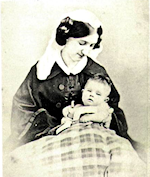 Mary had written a number of verses for the soldiers, and they had been printed as leaflets, each one floated over by the flag in red and blue, and distributed widely among the enlisted men. The first of these was
Mary had written a number of verses for the soldiers, and they had been printed as leaflets, each one floated over by the flag in red and blue, and distributed widely among the enlisted men. The first of these was

A Rainy Day in Camp.

It’s a cheerless, lonesome evening,
When the soaking, sodden ground
Will not echo to the footfall
Of the sentinel’s dull round.

God’s blue star-spangled banner
To-night is not unfurled;
Surely He has not deserted
This weary, warring world.

I peer into the darkness,
And the crowding fancies come:
The night wind, blowing northward,
Carries all my heart toward home.

For I ‘listed in this army
Not exactly to my mind;
But my country called for helpers,
And I couldn’t stay behind.

So, I’ve had a sight of drilling,
And have roughed it many ways,
And death has nearly had me;-
Yet I think the service pays.

It’s a blessed sort of feeling—
Whether you live or die—
You helped your country in her need,
And fought right loyally.

But I can’t help thinking sometimes,
When a wet day’s leisure comes,
And I hear the old home voices
Talking louder than the drums,—

And the far, familiar faces
Peep in at my tent door,
And the little children’s footsteps
Go pit-pat on the floor,—

I can’t help thinking, somehow,
Of all the parson reads
About that other soldier-life
Which every true man leads.

And wife, soft-hearted creature,
Seems a-saying in my ear,
“I’d rather have you in those ranks
Than to see you brigadier.”

I call myself a brave one,
But in my heart I lie!
For my country, and her honor,
I am fiercely free to die;

But when the Lord, who bought me,
Asks for my service here
To “fight the good fight” faithfully,
I’m skulking in the rear.

And yet I know this Captain
All love and care to be:
He would never get impatient
With a raw recruit like me.

And I know he’d not forget me;
When the day of peace appears,
I should share with Him the victory
Of all His volunteers.

And it’s kind of cheerful, thinking,
Beside the dull tent fire,
About that big promotion,
When He says, “ Come up higher.”

And though it’s dismal—rainy-
Even now, with thoughts of Him,
Camp life looks extra cheery,
And death a deal less grim.

For I seem to see Him waiting,
Where a gathered heaven greets
A great victorious army,
Marching up the golden streets.

And I hear Him read the roll-call,
And my heart is all a-flame,
When the dear, recording angel
Writes down my happy name!

—But my fire is dead white ashes,
And the tent is chilling cold,
And I’m playing win the battle,
When I’ve never been enrolled!




